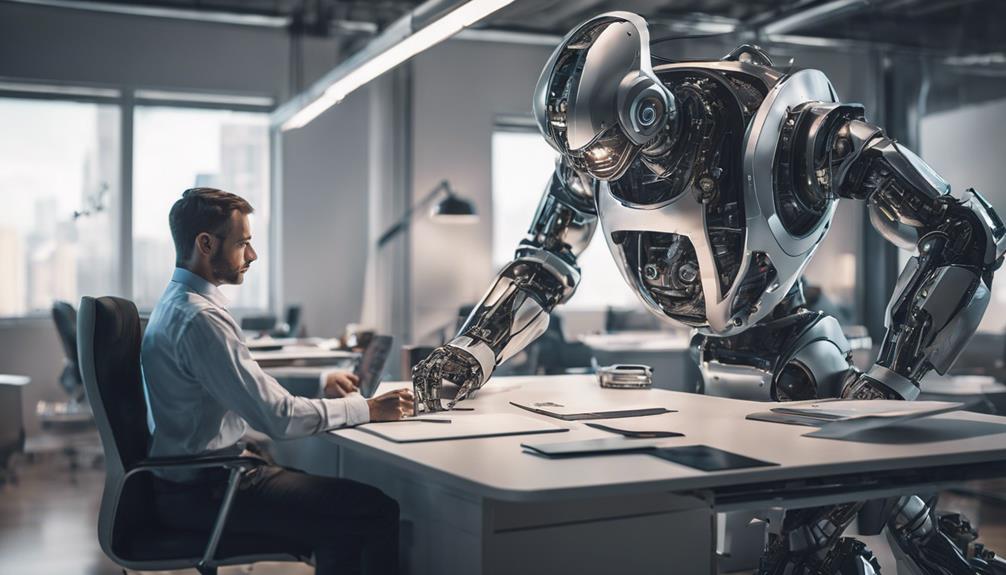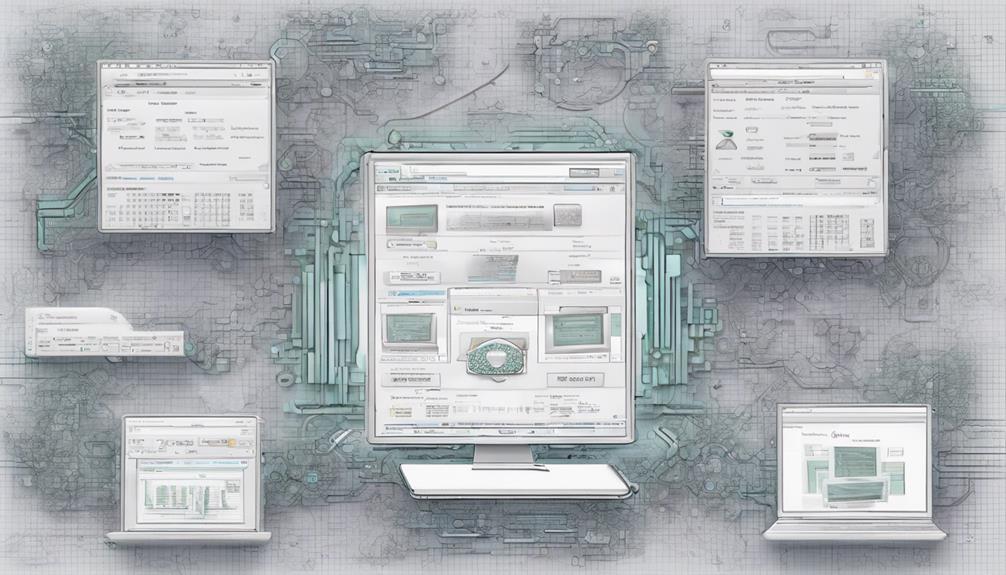In the fast-paced world we live in, the integration of Artificial Intelligence in the workforce has become a major concern for employees across different industries. The intricate web of AI encroaching on traditional job roles and the consequent shake-up it brings to the labor market is a matter that calls for careful analysis.
As we navigate the complexities of this technological revolution, it is crucial to comprehend the nuances of AI's impact on job security, skill requirements, and the overall trajectory of the job market. This guide offers a roadmap to understanding the multifaceted implications of AI's dominance in the workplace, urging us to reevaluate our approach to career planning and professional development.
Key Takeaways
- AI threatens 85 million jobs by 2025, impacting roles like customer service and programming.
- Upskilling in AI is crucial to adapt and thrive in automated job markets.
- Soft skills and human involvement remain essential in AI training and development.
- Continuous learning, agility, and specialization are vital strategies for navigating the evolving job landscape.
Impact of AI on Job Markets
The profound impact of AI on job markets is evident through the projected replacement of 85 million jobs globally by 2025, signaling a significant shift in hiring dynamics. As AI continues to advance, it is poised to replace certain roles that involve repetitive tasks and do not necessitate high levels of human intelligence. Jobs such as customer service representatives, drivers, programmers, analysts, and paralegals are at risk of being automated. However, occupations that require complex problem-solving, critical thinking, and human interaction, like teachers, nurses, therapists, and tradespeople, are less susceptible to AI replacement due to the nuanced skills and emotional intelligence they demand.
While the displacement of workers due to AI is a concern, the technology also offers opportunities for upskilling and reskilling the workforce. AI technology can redirect human effort towards more productive tasks, leading to the creation of new job opportunities and the transformation of existing roles in the job market. This shift underscores the importance of developing skills that complement AI capabilities to remain competitive in the evolving job landscape.
Benefits and Challenges of AI

AI technologies offer a diverse range of benefits and challenges that shape the current landscape of innovation and productivity in various industries. According to the Future of Jobs Report, certain jobs are most exposed to automation, highlighting the importance of understanding how AI tools can both enhance and disrupt the workforce.
While AI algorithms can streamline processes and save time on tedious tasks, there is a growing concern about the skills needed for the future workforce. AI has the potential to create new job roles and opportunities, such as machine learning engineers and AI ethics specialists. However, it also raises questions about the importance of soft skills and human involvement in training and monitoring AI systems.
As AI continues to evolve, businesses and workers must adapt by upskilling in AI competencies to mitigate potential job displacement and embrace the transformative power of AI in the foreseeable future.
Strategies for Adapting to Automation
How can individuals effectively navigate the evolving job market influenced by automation through strategic skill development and adaptation?
In the face of AI's increasing presence, adapting to automation necessitates a multifaceted approach. Lifelong learning, soft skill development, and agility in acquiring new skills are crucial strategies for success.
Specializing in specific areas and keeping abreast of AI technology developments can enable individuals to thrive in a workforce heavily influenced by automation. Institutions like Nexford University, offering AI specialization programs, equip individuals with the essential skills to navigate the changing job market driven by AI.
The integration of AI in businesses not only drives efficiency and enhances decision-making but also provides valuable insights for adapting to automation in the workplace. Adapting to automation demands a proactive stance on upskilling, reskilling, and embracing AI technologies to remain competitive in evolving job markets.
Future Job Trends in AI

Amidst the rapidly advancing landscape of technology, the trajectory of job trends in the realm of artificial intelligence is undergoing significant transformation. Market trends indicate a surge in the demand for workers skilled in machine learning and AI systems, particularly in sectors like customer service, autonomous vehicles, and generative AI. These advancements are reshaping the job market, with a notable shift towards automation impacting white-collar workers.
The future of jobs in AI will require individuals to acquire new skills to remain competitive in the evolving job market. As AI systems become more integrated into various industries, the need for workers proficient in handling these technologies will continue to grow. Moreover, the rise of AI in fields like mental health indicates a paradigm shift towards innovative solutions.
Skills for Thriving in Automated Industries
In today's rapidly evolving industries dominated by automation, the cultivation of essential skills is paramount for individuals aiming to thrive amidst technological advancements.
Developing critical thinking and problem-solving skills is crucial in navigating the complexities of AI-driven workplaces. Enhancing creativity and emotional intelligence can help individuals differentiate themselves in job markets heavily impacted by automation.
Acquiring technical skills and adaptability is essential for effectively maneuvering through automated industries where routine tasks are increasingly automated. Continuous learning is a cornerstone for staying competitive and relevant in fields reshaped by AI.
Strong communication skills and the ability to collaborate effectively are invaluable assets in environments driven by artificial intelligence. Embracing new skills such as content marketing, market research, and social media management is essential as industries transition away from manual labor towards roles that require high cognitive abilities.
These skills not only help workers remain relevant but also prepare them for the likely jobs of the future in automated industries.
Frequently Asked Questions
How AI Is Replacing Jobs?
AI is replacing jobs through automation of routine tasks, impacting roles like customer service, driving, programming, analysis, and legal support. Industries such as healthcare, agriculture, and manufacturing are experiencing significant disruptions in hiring practices due to AI advancements.
Which Jobs Will Be Taken Over by Ai?
AI is poised to revolutionize industries by automating tasks traditionally performed by humans. Roles like customer service representatives, drivers, programmers, research analysts, and paralegals are likely to be absorbed by AI, reshaping the job market significantly.
Will Artificial Intelligence Take Over My Job?
Artificial intelligence (AI) has the potential to automate many tasks, affecting various job roles. The impact varies across professions, with occupations involving complex human interactions less likely to be fully replaced. Understanding AI's capabilities and limitations is crucial for workforce adaptation.
How Is AI Causing Job Loss?
AI causes job loss by automating tasks previously done by humans, impacting industries worldwide. The displacement of workers in roles like customer service, driving, and programming is evident. AI's efficiency threatens job security, particularly in healthcare and industrial sectors.
Conclusion
In conclusion, as the wave of Artificial Intelligence continues to reshape job markets, individuals and businesses must adapt to this evolving landscape to thrive in automated industries.
The benefits of AI in saving time and creating new opportunities are evident, yet challenges such as job displacement and ethical considerations must be carefully navigated.
By honing relevant skills and staying abreast of future job trends, stakeholders can embrace the transformative power of AI while ensuring sustainable growth and success.









